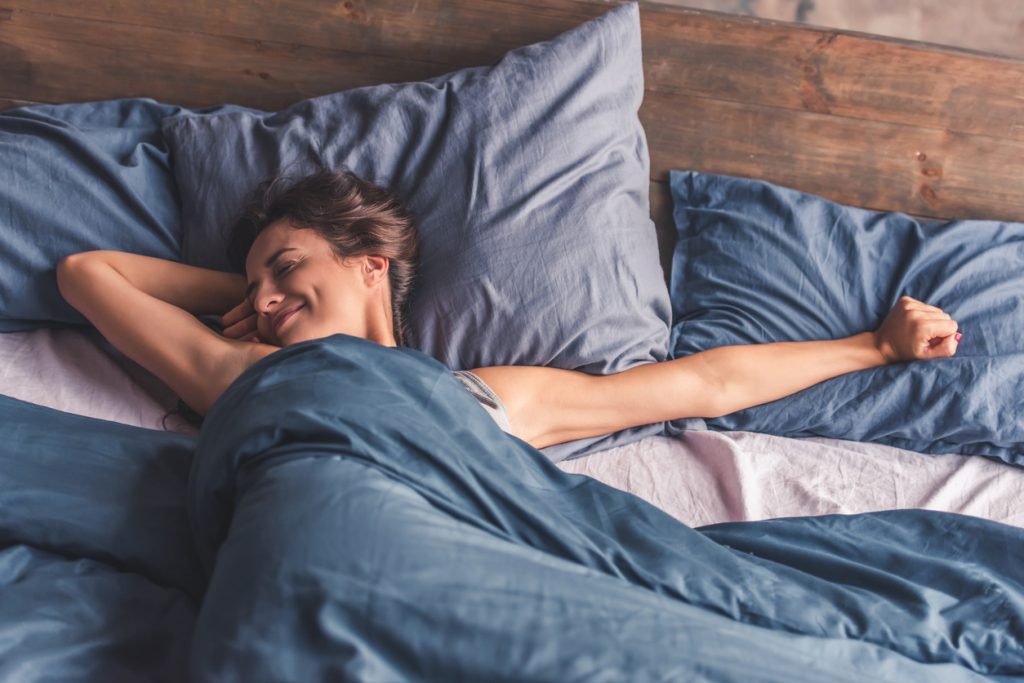5 Strategies for Better Sleep

According to the American Psychological Association, at least 40 million Americans suffer from over 70 different sleep disorders and 60% of adults report having sleep problems a few nights a week or more. Americans sleep 90 minutes less per night than they did 100 years ago. The era of Starbucks has been surpassed by one of prescription stimulants, such as Dexedrine and Ritalin, to keep people awake and functioning. These medications are also known as “speed” or amphetamines.
Most of us need at least 8 hours of restful sleep a night. We evolved along with the rhythms of day and night. These light and dark signals trigger a cascade of hormonal and neurochemical reactions that keep us healthy by repairing our DNA, committing new information to memory, building tissues and muscle, and regulating weight and mood chemicals. More severe sleep deprivation has even been linked to hypertension, increased stress hormones, irregular heartbeat, and a reduction of the body’s natural killer cells that are key to a properly functioning immune system. If you’re someone who sleeps 5 hours a night and then drinks lattes or takes medications to stay awake, you need to seriously reconsider this policy if you want to lose weight and live a healthy life. Here are my top 5 tips for getting a better night’s sleep:
- Use your bed ONLY for sleep and sex. Avoid reading, watching television, working or sending emails while in bed which creates a conditioned response of wakefulness. By using your bed for only sleep and sex, you are setting up the right external cues and conditioning for your body to get into a sleep state. If you wake up, try a 10-15 minute guided meditation. If you are still awake after this, get out of bed and go back only if you are ready to sleep. Do not try to force yourself to sleep. The more you try to fall asleep, the more you will stimulate your brain, making it that much harder to go to sleep.
- Create total darkness. Lack of complete darkness at night has a profound impact on the pineal gland in the brain, the control center for melatonin that regulates sleep and wakefulness. Remember, your eyelids are opaque, not completely lightproof. Set up your bedroom to be as dark as possible before you go to bed, or use an eye mask. Additionally, you want to start blocking light from hitting your eyes at least a couple of hours before going to sleep. Start by turning down the lights in your home and if you are going to look at a screen of any kind an hour before bed, wear blue light blocking glasses.
- Soak up the sun. Aim for about 20 minutes of direct, un-blocked sun exposure every day. This is crucial not only for vitamin D synthesis, but also for improving mood through the release of endorphins and supporting optimal sleep-wake cycles. Adequate light exposure reduces overall stress on your body. If you live far from the equator or get minimal exposure, such as during the winter months, we recommend you use a light box for 20-30 minutes every morning. Look for one that emits 10,000 lux. Some examples of high quality brands include Northern Light Technologies and Sphere Gadget Technologies.
- Don’t eat right before bed. Eating a heavy meal right before bed can lead to a poor night’s sleep. You will be more likely to experience reflux, have nightmares, and feel sluggish in the morning. What’s more, eating in the few hours before bed is a sure way to gain weight. Eat no later than 2-3 hours before bed to avoid these problems. Also, avoid drinking a lot of fluids before bed—aim for your 8 glasses of water before six o’clock at night. This will keep you from waking up frequently to urinate.
- Avoid medications that interfere with sleep. Certain medications (even those designed to help you sleep) can have a negative impact on your body’s natural rhythms. Unless otherwise instructed by a doctor, avoid these medications that can interfere with sleep:
- Sedatives (These are used to treat insomnia but can ultimately lead to dependence and disruption of normal sleep rhythms.)
- Antihistamines
- Stimulants (often found in cold medications and weight-loss medication)
- Cold medications
- Steroids
- Headache medications containing caffeine
Getting enough high-quality sleep is imperative to your health. Living in such a busy world, with so many constant distractions, can make it easy to neglect healthy bedtime rituals. You can use the tips above to look at your daily routine more closely and understand where possible sleep disturbances stem from. It’s important to carve out the time and space for good sleep hygiene, so that you can wake up each morning feeling fully rested and ready to start the day.

